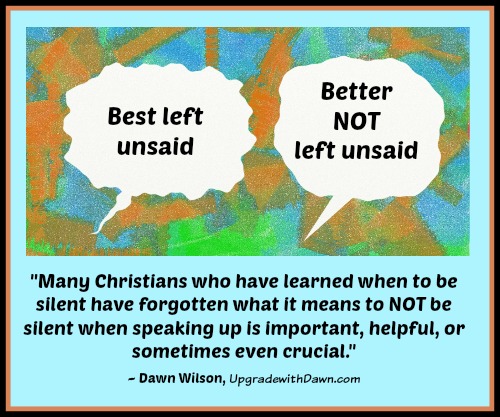Left Unsaid: Two Perspectives
In this Relationship UPGRADE, Dawn Wilson reminds us there are words best left unsaid, but others that need to be said.
"Words, along with all the manifestations of Christlike love, are a key to good relationships," Dawn says, "but do we truly care how we use our words?"
Ecclesiastes 3:7 tells us there is “a time to be silent and a time to speak,” and the wise Christian will learn when and what words are appropriate.
I. Some Words Need to Be Left Unsaid.
There’s a time to be silent.
I cannot count all the times I’ve “bit my tongue” during my marriage. Once I actually bit it as I started to say something sarcastic, then shut my mouth quickly and my tongue ended up between my teeth. My sarcasm bit me back!
Words can bless and encourage, but wisdom guards the tongue, knowing how hurtful and destructive words can be.
Words best left unsaid come from heart issues.
For example:
- Haughty words come from a proud heart.
- Ungrateful words come from a selfish heart.
- Condemning words come from a jealous heart or an unforgiving heart.
James warns we need to bridle our tongues (James 1:26) or tame them if we want to live as a true Christ-follower. We must discipline the tongue, because it is unruly and rebellious.
My friend Kimberly Wagner shared 10 excellent ways to guard and tame the tongue. My favorite is to learn the H-A-L-T Principle. Learn to restrain your words—shut your mouth—and delay conversations when you are Hungry, Angry, Lonely or Tired. (Smart lady!)
Basically, in the flesh, we tend to spout off with "corrupting talk," but the Holy Spirit can give us the wisdom and grace to speak life-giving words (Ephesians 4:29).
II. Some Words Must Never Be Left Unsaid.
Yes, there's a time to be silent. But then, there’s a time to speak up!
Many Christians who have learned when to be silent have forgotten what it means to not be silent when speaking up is important, helpful, or sometimes even crucial.
1. We need to speak up about our greatest love—Jesus!
We need to fearlessly speak up about Jesus, because we have the promise that the Holy Spirit will help us (Mark 13:11) and His Word will not return to Him empty (Isaiah 55:11).
David Robertson, a minister in Dundee, Scotland, wrote that he was once a “secret Christian” because he wasn’t sure he could bear the social stigma of living in post-Christian Scotland. He says a group of Christians at his school asked if he would speak on their behalf in a debate and he reluctantly agreed.
After the debate, the head of the English department congratulated his "performance," but added, “You almost had me persuaded that you really were a Christian.” Robertson replied, “Sir, I am. And that is the last time anyone will say that to me.”
Robertson learned to speak up—what he calls “ordinary, courageous speaking”—out of love for the Lord.
“We speak up because we love Jesus and we want to see Him glorified,” he said. “We speak up, not to defend ourselves, but because we love those we are speaking to and want them to share in the greatest gift of all: Christ.”
2. We need to speak up when evil seems to prevail.
In a culture gone wild, with social norms crumbling and evil prevailing, Christians can’t sit back and “observe.” We have to speak up.
Rather than running away and hiding, we need to turn and face the enemy and speak the truth.
How the enemy responds is not our responsibility. Peter and John responded to the rulers who told them not to speak in the name of Jesus anymore (Acts 4:13-20) because they knew their culture’s only hope was the Savior.
“… we cannot but speak of what we have seen and heard,” they said.
We don’t have to “win” arguments. We only have to stand up and speak up, and tell people God’s perspective as found in the Word.
It’s not about our opinions; it’s His truth.
When we speak the truth—always with the motive of love (Ephesians 4:14-15)—the Holy Spirit can use our words to make an impression for righteousness in the world and help our spiritual brothers and sisters mature into Christ.
3. We need to speak up when our brothers or sisters struggle or hurt.
Christians are meant to speak encouraging words to one another to build each other up (1 Thessalonians 5:11), especially in times of struggle or pain.
We may think about sharing words of comfort, encouragement, challenge or hope ... but unless we act and actually speak up, how will our friends and family be helped?
Words of encouragement are sometimes like soothing oil, helping others to bear up under their burdens (Galatians 6:2). Other times they are like motivating cheerleaders, lifting people up (Proverbs 12:25) and stirring them up to love and good works (Hebrews 10:23-25).
What should be left unsaid, and what should not be left unsaid?
It might be wise to examine our hearts regularly, because we must never forget: the tongue has power to hurt and also power to heal.
"Death and Life are in the power of the tongue...." (Proverbs 18:21).
What about you? Do you need to seek forgiveness for hurtful, destructive words? Are there words someone in your circle of influence desperately needs to hear?
Dawn Wilson, founder and President of Heart Choices Today, is a speaker and author,  and the creator the blog, Upgrade with Dawn. She is a contracted researcher/reviewer for Revive Our Hearts and a writer at Crosswalk.com. She and her husband Bob live in Southern California and have two grown, married sons, three granddaughters and a rascally maltipoo, Roscoe.
and the creator the blog, Upgrade with Dawn. She is a contracted researcher/reviewer for Revive Our Hearts and a writer at Crosswalk.com. She and her husband Bob live in Southern California and have two grown, married sons, three granddaughters and a rascally maltipoo, Roscoe.
Graphic adapted, courtesy of Prawny at Morguefile.
 Post a Comment → Posted on
Post a Comment → Posted on  Thursday, May 9, 2019 at 1:00PM
Thursday, May 9, 2019 at 1:00PM  Dawn Wilson,
Dawn Wilson,  Encouraging Words,
Encouraging Words,  Guard the Tongue,
Guard the Tongue,  Left Unsaid,
Left Unsaid,  Speak Out,
Speak Out,  Speak Up,
Speak Up,  Taming the Tongue,
Taming the Tongue,  The Tongue,
The Tongue,  Upgrade with Dawn,
Upgrade with Dawn,  Words Upgrade Your Life
Words Upgrade Your Life  Biblical Thinking,
Biblical Thinking,  Relationships
Relationships 






